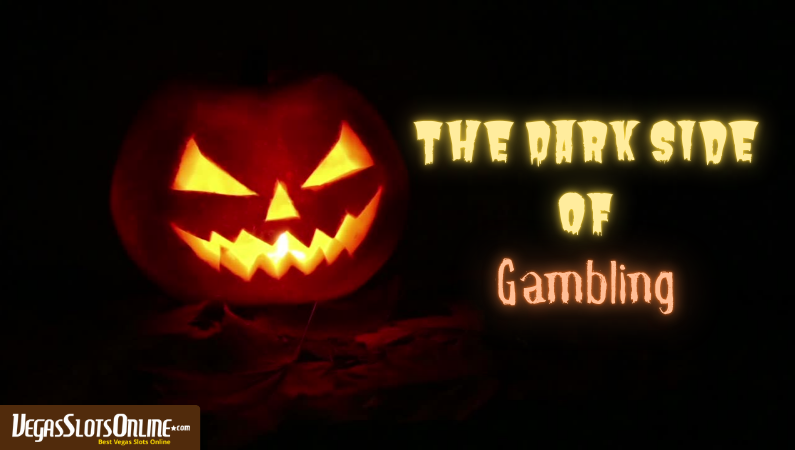Halloween is a centuries-old Celtic tradition that first began as a way to ward off spirits when the souls of the dead returned to their homes once a year. Today, it’s an excuse to dress up and eat candy.
Many online casinos capitalize on the spooky season, offering bonuses like “Pragmatic Hallowins” (a Halloween-inspired version of Pragmatic Play’s “Drops & Wins” promotion featuring games like Big Bass Halloween and Madame Destiny Megaways). There are thousands of Halloween-themed slots with exciting gameplay, bonus features, and big payout potential for those who take the risk.
Addiction is a dangerous and prominent threat to every bettor
But much like the haunting roots of the Halloween festival, there’s a dark side to gambling. Addiction is a dangerous and prominent threat to every bettor, whether you’re playing at a licensed and regulated casino or a black market offshore sportsbook.
Ahead of the year’s scariest holiday, we’ve highlighted some of the most chilling addiction stories from around the world to raise awareness of the darker side of gambling.
A father sold his toddler on Facebook to bankroll his gambling
Yep, you read that right. An Indonesian man sold his child on Facebook Marketplace in order to keep gambling on online slots. After running out of cash for his online gambling addiction, the man – identified only as RA – decided to cash in on a desperate Facebook Marketplace ad and sell his 11-month-old baby for 15 million Indonesian Rupiah ($958).
Both the father and the couple involved in the sale were arrested
When his wife returned home and discovered the child was missing, she immediately called the police, and the baby was soon returned. Both the father and the couple involved in the sale were arrested and questioned by the police, but the mother withdrew her case against the couple. She said that although their actions were unforgivable, she could understand the desperation of trying and failing for a decade to have a baby of their own.
Gambling is a big problem in Indonesia. A journalist was killed in a home fire for reporting on gambling in the Indonesian military; influencers in the country are being arrested for advertising black market gambling platforms; and even its Governor has been accused of embezzling government money and gambling millions of dollars worth of public funds.
‘Mick Jagger’ began gambling at 12 years old
Earlier this year, the UK-based broadcasting channel ITV revealed that a British man legally changed his name to Mick Jagger in an attempt to distance himself from decades of addiction. The man, whose previous name was not revealed to the public, began wagering on horses when he was only 12 years old.
‘Jagger’ lost hundreds of thousands of pounds
In the five decades since he started gambling, ‘Jagger’ lost hundreds of thousands of pounds, became homeless, was disowned by his children, and contemplated suicide on numerous occasions.
It was only two years ago that the 62-year-old gambler was able to turn his life around. After building a relationship with the homeless charity Emmaus, ‘Jagger’ moved into the charity’s accommodation and, with their support, was finally able to overcome his addiction. Far from the rock-and-roll lifestyle of his namesake, ‘Mick Jagger’ now works as a gardener.
Though he no longer gambles, ‘Jagger’ says he gets the urge every day, especially as British sports like soccer are “run by gambling advertising.” He’s not wrong; 11 of the 20 English Premier League teams are sponsored by gambling companies. Though the EPL has instituted a ban on front-of-shirt gambling sponsors by the 2026/27 season, several major EPL teams – including Chelsea, Liverpool, and Newcastle – have recently been called out for breaching the Under 18’s gambling code.
Shohei Ohtani was scammed out of $16m by his interpreter
Shohei Ohtani, superstar of the Los Angeles Dodgers, was recently embroiled in a career-defining scandal when it was revealed his interpreter, Ippei Mizuhara, had stolen over $16 million from Ohtani’s bank account to pay off his gambling debts.
The baseball legend had been completely unaware of the money leaving his account
Mizuhara set up a bank account specifically for Ohtani’s baseball salary, then used it to pay off the illegal sportsbooks with which he had accumulated millions in betting debts. Despite conspiracy theories of potential Yakuza coercion, Ohtani himself was found innocent. The baseball legend had been completely unaware of the money leaving his account.
Mizuhara now faces up to 33 years in prison, a fine of $1,250,000, and five years of supervised release. Matthew Bowyer, the bookmaker who accepted the bets, has also pleaded guilty to three charges of unlawful business operation, money laundering, and false tax returns.
Mizuhara’s capacity for blindsiding and preying on the vulnerabilities of the very man he was hired to translate for is a horrifying tale. But you know what’s even scarier? Having so much money in the bank that you don’t even notice millions of dollars disappearing…
A son stole over $80,000 from his dying mother
In another case from across the pond, a British man named Dominic Wilkinson stole more than £65,000 ($83,117) from his dying mother, who had given him control of her finances after moving into a residential care home for dementia. Instead of putting the money towards her £78,000 ($99,740) care home fees, Wilkinson gambled it all away.
Wilkinson applied to the local Council for support to pay her care home fees
Wilkinson sold his mother’s house for £157,000 ($203,694) and transferred the £65,000 ($84,332) to his account after the sale. When his mother’s savings dropped to just £8,000 ($10,379), Wilkinson applied to the local Council for support to pay her care home fees.
The care services manager reported the suspicious situation to the police, who discovered that Wilkinson had made 70 payments to the Entain-owned Coral bookmakers in just seven months. His 55-year-old mother passed away during the police investigation, and he received a two-year suspended prison sentence and 300 hours of community service.
A Twitch streamer lost his life savings after partnering with Stake.com
Popular Twitch streamer DNP3 rose to fame by playing video games and giving away consoles and PCs. After venturing into the world of gambling streaming, DNP3 was offered a sponsorship agreement with the (in)famous crypto gambling platform Stake.com.
Stake.com is well-known for its numerous high-profile sponsorships, most notably the Canadian rapper Drake with his Stake-sponsored giveaways and astronomical sports bets (most of which result in astronomical losses). But what first appeared to be a once-in-a-lifetime, career-advancing opportunity for DPN3 soon turned into a living nightmare as he fell into a deep gambling addiction and wagered away his life savings.
It took only a year or so for the streamer to fall from the peak of his career to the lowest pits of debt and despair. He’s now part of a gambling rehabilitation group to aid recovery from his addiction.
streamers are finding loopholes that allow them to continue streaming casino content
Despite a Twitch ban on gambling, streamers are finding loopholes that allow them to continue streaming casino content. Those who don’t just move their profiles from one streaming service to another, including the Stake-backed platform Kick.
Kick, whose leading live streaming category is ‘Slots & Casino,’ launched right after Twitch announced its gambling ban. It even offers a Creator Incentive Program to entice more users to stream (and gamble) on its platform.
Responsible Gambling
Feeling suitably spooked by the haunting stories detailed above? If not, you should! Gambling addiction can happen to anyone, no matter if you’re a total novice or an experienced player.
Online casinos make it even easier to deposit and wager life-threatening sums of money, so it’s essential to implement responsible gambling habits when betting online. Set budgets, use account restriction tools, and self-exclude if necessary!
Below are some of the biggest responsible gambling resources available to players around the world. Additionally, every legal gambling jurisdiction will offer localized support like counseling, toll-free phone lines, and support groups.
- National Council on Problem Gambling
- GambleAware
- Gamblers Anonymous
- Gam-Anon
- GamStop
- Gambling Therapy
- GamCare
FAQs
What percentage of people have a gambling addiction?
Most studies suggest that gambling addiction affects around 1% of the adult population in the US. This number is slightly lower in the UK, standing at around 0.5% of adults. However, 7% of the UK population is affected negatively by the gambling of another person.
What tools can I use to help curb my gambling?
All regulated gambling websites must offer a number of tools to help prevent you from gambling beyond your means. Many sites offer cool down periods, allowing you to lock yourself out of your account for a short term, deposit limits, allowing you to limit your deposit amounts, and self exclusions, which block you from your account for a longer term.
What is the best way to get help for gambling addiction?
Gambling addicts can reach out to a number of groups if they want help. Every country with legal gambling offers localized support, including counseling and support groups. In the US, calling 1-800-GAMBLER will connect you with several resources related to gambling issues.




